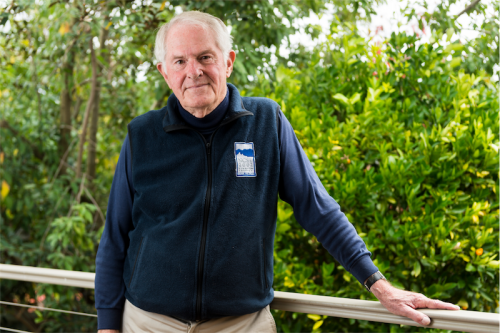
Greg Cornwell… “Most of us elderly go with the flow in relation to these societal changes, accepting that there is nothing we can do to turn back the clock to a simpler time.” Photo by Andrew Finch
Like most other retired people, I have seen a great transformation of society, much of it beneficial: such as a kinder attitude to single mothers and their children. I also have seen stupidities like being unable to smack your child.
Political correctness has entered our lives often with unfortunate results. Certainly we always had a few euphemisms so that people didn’t die but passed away, entered eternal life or, more vulgarly, fell off the perch. However, now we have carried this attitude to death to an extent anyone in contact with a fatality – always identified as tragic – even if several parts removed (such as being in the same school), receives counselling. Incidentally, we never hear if this failure to face the reality of the human condition really works and the recipients return to being no more mixed up than they were before the “terrible” happening.
We also have been subject to social justice, so laws now prevent ageist, racist, religious and sexist discrimination in comment or behaviour – fortunately, we can still think freely. Again all is not bad. Anti-discrimination against the disabled, for example, is long overdue.
Most of us elderly go with the flow in relation to these societal changes, accepting that there is nothing we can do to turn back the clock to a simpler time.
In those days there were few drugs to kill or criminalise our children, when the law punished offenders according to the seriousness of the crime and such extraneous issues as unhappy or dysfunctional childhoods or expressions of remorse after the fact were not taken into account and when anonymous parole boards did not release people who subsequently committed further crimes, including rape and murder.
We elderly generally accept that the future lies with the young and if they accept such aforementioned changes to how we all now live then why should those in the twilight of our lives object?
So we accept changing attitudes even if some of us may feel uncomfortable about the direction society is taking. Gay marriage, for example, is a divisive issue across the country, as is the question of Australia becoming a republic. Matters for majority decision, I suggest.
As also should be the right to die.
Why, as elderly people accepting that we should not dictate to the young how they should live their uncertain lives, should we be denied the opportunity to decide how and when we will end our own? Why should we live our declining years in undignified, often painful circumstances, immobile, incontinent, and unconsulted.
As I have doubts about a free vote in Parliament, how about a referendum?
Greg Cornwell is a former MLA and Speaker of the House of Assembly.
The post Cornwell / What about the right to die? appeared first on Canberra CityNews.